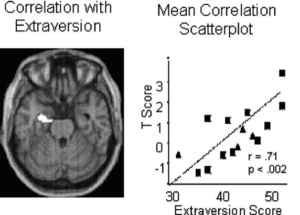This image shows how extraversion correlates with the activation of a certain brain region, the Amygdala, in reaction to seeing happy faces [1].

So, should we track and measure ourselves on the grounds of the ethics of self-knowledge? In some cases, PI technology can provide valuable information that can lead to self-knowledge relevant for prudential interests, other-directed concerns, and duties to oneself. However, it also provides a host of information that is inaccurate, insignificant, and intransparent – junk information. If we are concerned with self-knowledge, instead of counting daily steps or learning whether you are in the top 2% of Childish Gambino listeners, we might do better to first pay attention to who defines relevant categories of self-characterization as well as how and in whose interest this occurs.
The pursuit of self-knowledge is traditionally understood as a matter of introspection, of looking inward. But in the last decades, it is external devices that have promised us insight into who we are, from phones to watches to health trackers. These are technologies that can gather a vast amount or new kinds of personal information (“PI technologies” for short). PI technology can provide autobiographical information through text messages, pictures, location trackers, call logs, email and browser histories, and more. Technologies that allow us to capture and store even the most mundane past experiences and social interactions have become much more powerful and accessible (particularly in industrialized nations) in the past decades. PI technology furthermore allows us to gather a vast amount of information about our health and activity through fitness trackers, step counters, or apps like DrinkLess to reduce alcohol consumption and MySugr to measure glucose levels for diabetics. A further category of a comparatively novel kind of technological personal information is neuroinformation. Information about the brain stands out in comparison to other bioinformation because aspects deemed central for identity, such as personality, memory, and mental capacities depend on it. Neuroinformation, commonly gathered through neuroimaging, can reveal not only mental health but social attitudes, personality, humor, memories, or impulse control [1]. In one of the most advanced forms of mind-reading researchers were able to decode the semantic content of a movie a person was watching by measuring brain activity [2]. Lastly, I want to mention the far-reaching inferences that can be drawn from online behavior. Spoken languages, age, political opinions, income bracket, specific present and likely future preferences in food, clothes, or entertainment, and even whether one is likely to have insomnia or depression can be inferred from social media posts, Facebook likes, web search queries, location trackers, purchase records, playlists, how we interact with a homepage, and other traces we leave online [3]. Smartwatch. Wikimedia Commons
Self-knowledge is not just about collecting facts about yourself but requires interpretation, assessment, and concepts of categorization. To discover helpful behavior in your text messages and characterize yourself as a helpful person you have to understand what it means to be helpful and why being helpful is a meaningful characteristic. Those characterizing concepts are created, shaped, and disputed in a social and political environment. PI technology is part of this environment and shapes and defines such characterizing categories. It can, for instance, influence what we deem significant about ourselves. A few decades ago, hardly anyone used to know their daily step count. Now, for many people, it is at least temporarily an important project to achieve a certain number of steps a day. The widespread use of a handful of technologies gives some companies an exceptionally powerful voice in this debate on how we should define ourselves. Because such characterizing concepts can be damaging or oppressive, we should consider carefully who gets to shape them.

Written by Muriel Leuenberger
Among the various reasons we have to pursue self-knowledge, some are straightforwardly prudential (meaning self-interested or self-regarding). For instance, it is easier to get what you want if you know what it is. Knowing your strengths, limits, and boundaries can help you to set realistic goals and pursue them effectively. Self-knowledge is also important for self-control. If I know I get angry when I am hungry, I can exert indirect control over my anger by making sure I don’t get too hungry. Similarly, knowing the sources of your unhappiness can make it easier to control your behavior to promote well-being. Other reasons to pursue self-knowledge are not prudential, but other-oriented. Knowing oneself better can help to better manage personal shortcomings that may affect others. Knowing one’s body can help to detect and prevent disorders and thereby prevent costs for the healthcare system.
This kind of substantial self-knowledge can be hard to come by through PI technology, but it can nonetheless be a helpful tool. Some technologies can make direct claims about substantial characteristics. For instance, neuroimaging might identify a personality trait. However, so far, most of the direct characterizations by PI technology are rather crude. A neuroimaging study showing whether you are extroverted will likely not reveal anything substantially new to you. In most cases, current technology would not provide information in the form of a direct claim about substantial characteristics that go beyond what regular levels of self-awareness wouldn’t already grant. PI technology can, however, provide data that can serve as evidence from which we infer substantial self-knowledge. Autobiographical information stored in text messages, pictures, browser history, etc. can help someone to gain insights into how they behave with others, what they care about, and into their character, emotions, and beliefs. The preferences and other characteristics companies infer from online behavior can also cue self-reflection and personal insights. Why does Google think I like hiking? Do I like hiking? What made Spotify think I want to listen to this album?
PI technology may in some cases deliver personal information that can increase prudentially valuable self-knowledge as well as self-knowledge that benefits others. A person reading past text messages may come to realize that he comes off as aloof and distanced. This insight could help him to act differently and to establish closer relationships with the people he cares about. Information about one’s physical and mental health provided by health trackers, neuroimaging, or even digital profiling can help to manage limitations and disorders and to develop one’s strengths in a prudentially and socially beneficial way.
If we believe that self-knowledge is a good, and PI technology promises us more of it, is there a duty to use this technology, or use it in the right way? Should “track thyself” be our new mantra? Of course, this depends on whether PI technologies can provide us with information about ourselves that is truly relevant for the kind of self-knowledge we should have. Knowing the number of hairs on your head will not make you into a better, wiser, or happier person, nor will knowing exactly how many times you have listened to Despacito. But some information provided by PI technology still might.

The ancient Greek injunction “Know Thyself” inscribed at the temple of Delphi represents just one among many instances where we are encouraged to pursue self-knowledge. Socrates argued that “examining myself and others is the greatest good” and according to Kant moral self-cognition is ‘‘the First Command of all Duties to Oneself’’. Moreover, the pursuit of self-knowledge and how it helps us to become wiser, better, and happier is such a common theme in popular culture that you can find numerous lists online of the 10, 15, or 39 best movies and books on self-knowledge.
PI technologies can be a helpful tool to gain self-knowledge but, in many cases, they are likely not the best means to achieve self-knowledge. An honest conversation with a friend is often more helpful than the newest insights neuroimaging can give us. Moreover, PI technologies have some shortcomings regarding their ability to help us gain self-knowledge. They can be and often are inaccurate. You can look up what Google thinks it knows about you. Depending on your browsing habits this can be scarily accurate, but it still tends to get some things wrong. PI technology is also highly intransparent. How the information has been gathered, how the collected personal data is processed and connected to categories of preferences, personality, beliefs, disorders, etc., and how those categories are defined is often inaccessible or very complicated to understand, notably in the case of neuroimaging or digital profiling.
The recent philosophical debate has seen an increased interest in duties to oneself. Might we also be obligated to ourselves to know ourselves? One reason why we might think we have a duty to ourselves to pursue self-knowledge is that intimate relationships of love and respect require that we know the other person. Because we cannot avoid being in an intimate relationship with ourselves, self-love and self-respect require that we know ourselves [4]. Loving and respecting yourself requires having substantial self-knowledge which entails facts about your character, values, abilities, aptitudes, emotions, beliefs, and what makes you happy [5].
The ancient Greek aphorism gnōthi sauton «know thyself» is inscribed in the forecourt of the Temple of Apollo at Delphi. This mosaic depicts a Memento Mori from excavations in the convent of San Gregorio, Via Appia, Rome, Italy. Wikimedia Commons
- Canli, T. and Z. Amin, Neuroimaging of Emotion and Personality: Scientific Evidence and Ethical Considerations. Brain and Cognition, 2002. 50(3): p. 414-431.
- Huth, A.G., et al., Decoding the Semantic Content of Natural Movies from Human Brain Activity. Frontiers in Systems Neuroscience, 2016. 10(81).
- Loi, M., The Digital Phenotype: A Philosophical and Ethical Exploration. Philosophy & Technology, 2019. 32(1): p. 155-171.
- Mackenzie, J., Knowing Yourself and Being Worth Knowing. Journal of the American Philosophical Association, 2018. 4(2): p. 243-261.
- Cassam, Q., Self-knowledge for humans. 2014: Oxford University Press, USA.

